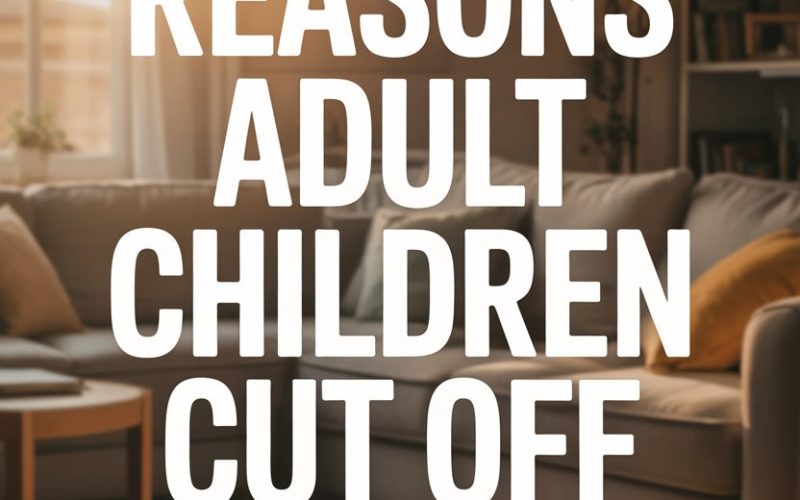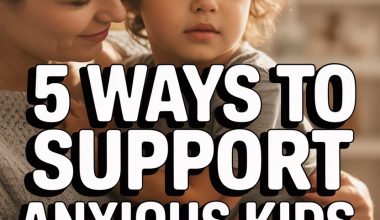Every parent’s silent dread: those adult children you raised, sacrificed for, and probably embarrassed a little at school concerts, suddenly… vanish.
Not in a dramatic, poof-of-smoke way, but the phone grows cold, birthdays get missed, and your WhatsApp memes go unread.
You’re left wondering: what on earth went wrong?
Before you start composing a guilt-ridden 2am text, let’s unpack why adults decide to cut off their parents—and, more importantly, what you can actually do about it.
1. Emotional Boundaries Were (Or Still Are) Ignored
Sure, “boundaries” might sound like something invented by therapists to keep themselves busy, but they matter—a lot.
Adult children often cite ongoing violations of their personal or emotional boundaries as a reason for pulling away. It’s less about not loving you and more about needing space to breathe.
This isn’t always about headline-grabbing mistakes. Sometimes, it’s years of unsolicited advice about their marriage, the way they parent, or if you have very strong feelings about their taste in curtains.
Occasionally, parents assume that parenting is a lifelong job description—complete with 24/7 access and commentary rights.
Researchers underline that consistent overstepping can lead to resentment and, eventually, silence. The fix? Respect the adult version of your child.
If you’re not sure whether something is off-limits, try asking: “Is it alright if I give my opinion?” As wild as it sounds, pausing before offering wisdom can be revolutionary.
2. Unresolved Trauma or Abuse
Some wounds run deep. For adults who grew up with physical, emotional, or verbal abuse, estrangement can be a path to healing—no matter how much time has passed or how “different” things feel now.
Sometimes, the parent in question has long since changed, or never fully realized how deep the hurt ran in the first place.
Family estrangement isn’t always about punishment; it can be about protection.
According to an Australian Institute of Family Studies report, adult children often cite unresolved childhood trauma as a key reason for cutting ties—especially when apologies and honest conversations are missing.
If this sounds familiar, stop short of defending yourself. Instead, try acknowledging that their feelings are valid, even if you remember things differently.
Apologies can be awkward, but “I’m sorry you felt alone” means a lot more than a defensive history lesson.
3. Toxic Family Dynamics
Families can be a cauldron of drama: sibling rivalry, favouritism, and that one cousin who always starts a scene at Christmas.
Some adult children grow up feeling like outsiders, scapegoats, or the “problem child.” When adulthood offers the power of choice, it’s not surprising that some choose distance.
A University of Cambridge study found that toxic family systems—full of triangulation, manipulation, or enmeshment—are a leading cause of estrangement.
Sometimes, the “toxic” label is attached to patterns that never seemed all that dramatic at the time: subtle digs, comparisons, guilt trips.
Ready for a reality check? Even well-meaning parents can create these dynamics without realizing it. Stepping outside the pattern starts with being curious: “Did you feel like I treated you differently?”
It’s a tough question, but it opens the door to perspective-taking.
If family gatherings always end in tears, consider professional help—family therapists exist for a reason.
4. Clashing Values and Life Choices
Take a look at your child’s Instagram, and you might find them living a life you barely recognize. Different partner? Check. New religion? Check.
Moved halfway across the world to herd llamas as a minimalist vegan? Also check.
Sometimes, the gulf between generations isn’t just a matter of taste—it’s about core values.
Whether it’s political beliefs, lifestyle decisions, or who they choose to love, when parents struggle to accept these choices or make their disapproval clear, adult children may choose silence over conflict.
A Pew Research Center poll notes that differences in belief systems and cultural shifts are a growing reason for family rifts. Tension can ramp up when parents try to “fix” or challenge these decisions, rather than accept them.
What helps? Try swapping judgment for curiosity. “Tell me why this matters to you” beats “When are you going to settle down and get a real job?” every time.
If you find yourself biting your tongue, congratulate yourself. That’s emotional growth, right there.
5. Poor Communication and Unspoken Expectations
“Why don’t you ever call?” “Why am I always the one reaching out?” “Why won’t you just come home for the weekend?” Sound familiar? Communication breakdowns are at the heart of many estrangements.
Adult children may feel like no matter what they do, it’s never enough, or that the relationship is built on guilt and obligation.
Unspoken expectations—about how often you should talk, who should initiate, or how grandkids should be raised—can turn into landmines.
According to a study by University of Cambridge, chronic miscommunication is a leading cause of family distance.
Start by lowering the stakes. Instead of guilt-tripping, try being open: “I miss you, and I’d love to talk more often. What works for you?”
Don’t expect instant results (no one likes a desperate WhatsApp barrage), but clear, kind communication can thaw even the iciest silences.
Mending the Silence
If you’ve read this far, you’re probably not out to ruin your child’s life or traumatize your grandchildren with stories about your walk to school “uphill, both ways, in the snow.” You just want to reconnect.
A few small tweaks tonight can make a world of difference. Choose listening over lecturing. Say sorry even if it feels awkward.
Celebrate their quirks—even the llama-herding phase. Accept that sometimes, your child’s need for distance is about them, not just you.
And if things are truly stuck, consider outside help—there’s no shame in consulting a family therapist.
Rebuilding bridges doesn’t require a grand gesture.
Sometimes, a message that says, “I’m here when you’re ready” is the best place to start.
And hey, if all else fails, there’s always cat memes.




